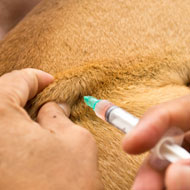Minimum age changed for Nobivac Rabies

The minimum vaccination age for Nobivac Rabies in dogs, cats and ferrets has been changed from three months to 12 weeks. (stock photo)
The minimum vaccination age for Nobivac Rabies in dogs, cats and ferrets has been changed from three months to 12 weeks. This brings it into line with the minimum age set out in the EU Regulation No 567/2013.
This change will affect the Summary of Product Characteristics (SPC) for the product, and the product leaflet.
MSD Animal Health said the revised advice can be applied to all UK product used from 6 June 2017, regardless of the leaflet information supplied in the packaging.
The data sheet has been updated and can be read in full online at www.noahcompendium.co.uk.
Changes to the SPC can be viewed here.
For advice on the changes, contact your account manager or MSD’s technical product support line: 01908 685685 (Option 1). Or email for technical support: vet-support.uk@merck.com



 The veterinary mental health charity Vetlife is inviting the veterinary community to join it for a sponsored cold-water dip.
The veterinary mental health charity Vetlife is inviting the veterinary community to join it for a sponsored cold-water dip.